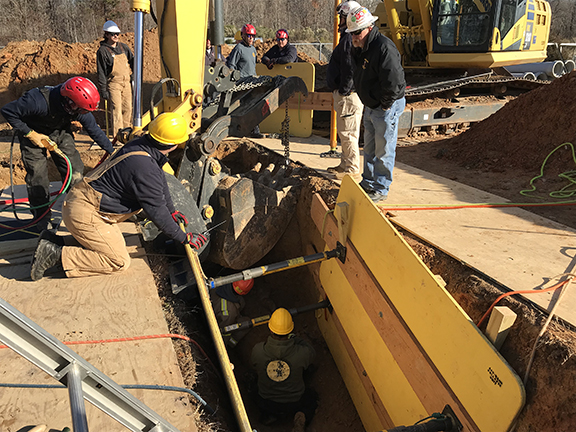Welcome!

Firefighters carry out a mock rescue operation in a trench at the Transfer Station off Presnell Street.
Fire Department trains for different types of rescues
Janet Imrick
Randolph Hub
Asheboro firefighters completed the hands-on training for trench rescues, part of the process to be certified in a unique type of emergency.
On Dec. 2, the B-shift met at the Asheboro Transfer Station with instructors from Thomasville-based RescueTec USA. Their test involved rescuing a live victim and recovering a deceased victim of a trench collapse. Two mannequins were pinned by a pipe and buried under dirt. They had to stabilize an excavator and the walls of the five-foot wide trench.
They rescued the live victim in 46 minutes.
RescueTec USA technical rescue specialist Chip Osborne says that during the previous week, Indianapolis firefighters performed a similar rescue in 45 minutes.
"That was a trained team. This team is learning, and they had a victim out in 46. That's very good," he said.
Approximately 60 firefighters from all shifts are being trained for specialized certifications in classes organized by Randolph Community College.
Osborne and lead instructor Scott McCallister both worked with emergency services for more than 30 years. McCallister says he answered nine cave-in calls.
"We try to bring the real world into this," he said. "Every group has had the opportunity to put hands on some very unique situations. They've been able to use every skill that they were taught in the final scenario."
Trench rescue skills can be used to save people in construction site accidents, roadside crashes, burst underground pipes and even home renovation mishaps.
"We used to have to rely on other departments that specialize in this type of rescue," Division Chief of Operations Frankie Kelly said. "We're cutting that time down bringing people that are certified and well qualified to take care of the situation."
Asheboro firefighters have been certified for hazmat, EMT, high-angle rescue, heavy rescue and confined space rescue. Kelly says they also plan to learn water rescue, structural collapse and agricultural rescue.
Structural fires have decreased to roughly two percent of the calls that firefighters answer. Most calls are medical and traffic-related. Nevertheless, Asheboro Fire is on track to receive 5,000 calls for assistance in 2022, an increase from previous years.
"We have become a resource to the outlying communities, also," Kelly said, “which I think is the intentions of our fire chief."
The fire department will ask the city council to provide funding for new trench rescue equipment, including a special trailer for carrying it.
"It's equipment we hope we don't ever have to use, but to have it," Battalion Chief Brent Powell said "We need it to be able to do what we're doing right now."
McCallister said it is one more step to being prepared to act as quickly as possible when lives are in danger.
"It only takes one tornado," he said. "If it happens to run through a residential community, you're going to have a lot of buildings to be searched and a lot of victims that potentially may need to be rescued.
“FEMA is not a first responder. They've got a long timeline to get those assets into a location. These guys are going to be on their own for 6 to 12 hours."
They will revisit confined space training in January to bring newly hired firefighters up to speed.
"We stay in training," Powell said. "We stay in class. You take classes your entire career."
